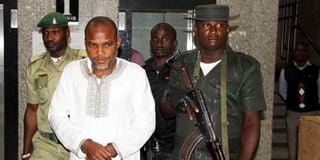Capture of Nnamdi Kanu: Kenyan envoy speaks

Nnamdi Kanu (centre), the head of the Indigenous People of Biafra movement, has been charged with several offences including terrorism-related ones.
The Kenya High Commissioner to Nigeria Wilfred Machage has denied allegations that his country had a hand in the arrest and deportation of Nigerian fugitive secessionist Nnamdi Kanu.
Kanu, 53, the leader of Indigenous People of Biafra, an organisation seeking the re-enactment of the secession of Nigeria’s southeast, had been hiding in the UK since he jumped bail in November 2017 while facing treason trial.
He was arrested then brought back to Nigeria on June 26, 2021 after two years of manhunt, prompting his family and lawyers to accuse Kenya of being complicit in the saga.
Mr Abubakar Malami, Nigeria’s Attorney-General of the Federation and Minister of Justice, told Nigerians that the IPOB leader was “intercepted through the collaborative efforts of Nigerian intelligence and security services abroad”, but he did not disclose the country where Kanu was arrested.
Kanu’s younger brother, Kingsley, later alleged that Kenya aided Nigeria in the arrest and deportation.
At a press conference on Friday in Abuja, Ambassador Machage dismissed the allegations and challenged anyone with evidence linking Kenya to the incident to produce it.
He described as “unfortunate and libelous” the linking of President Uhuru Kenyatta to Mr Kanu’s arrest and said the allegation was “concocted” to pit Nigerians in the southeast against Kenyans.
“Kenya was not involved in the alleged arrest in Kenya and extradition to Nigeria of Mr Kanu. These allegations are fictional, imaginary, and deliberately concocted to fuel antagonistic feelings among a certain section of the Nigerian people.
“I want to challenge anyone with facts relating to this alleged arrest in Kenya to present those facts. This includes when, where, how, and who was particularly involved in the alleged arrest," the envoy said.
Kenya, he said, was committed to sustaining the historical bond of friendship between the two countries and further cement diplomatic relations with the view to ensuring beneficial relations.
Kenya should not be dragged into the issue as the countnry has no question to answer but rather that the citizens of Nigeria should approach the Nigerian government for an explanation of where Kanu was arrested, he said.
Mr Kanu had been arraigned for the continuation of his trial and the Federal High Court in Abuja, and the court ordered that he should be kept in the custody of the Department of State Services (DSS) until July 26 when his trial will continue.
The British Commission in Abuja could not explain how Kanu, a citizen, was able to secure the passport with which he escaped from Nigeria in 2017 since both his British and Nigerian passports were deposited with the court as part of the bail conditions.
Mr Jonathan Bacon of the British High Commission said: “We can confirm that the British High Commission in Nigeria did not issue any travel documents for Mr Kanu.‘’





